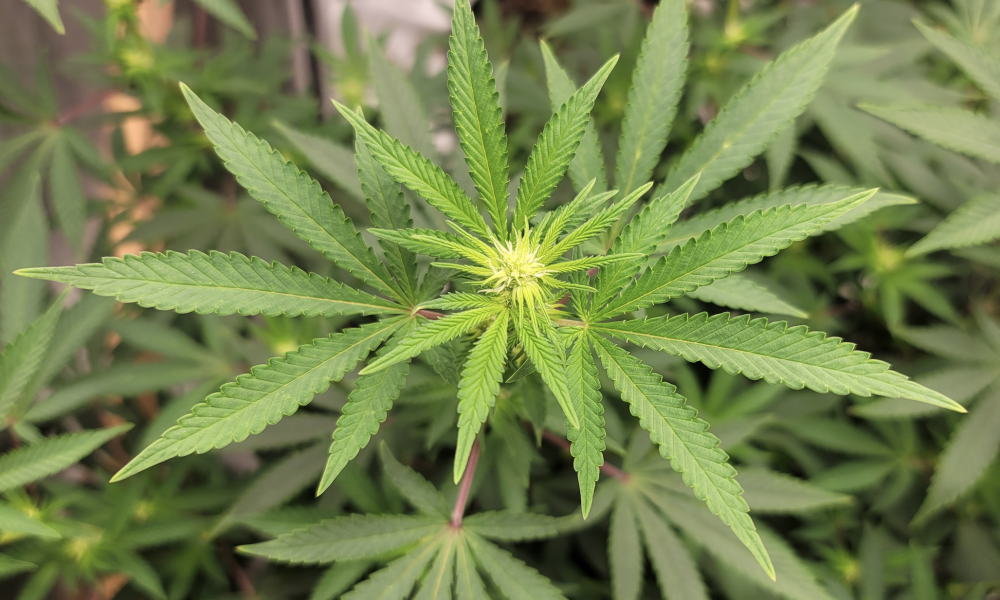With the end of the current Congress approaching, efforts to find areas of compromise on marijuana reform are increasing—with lawmakers, advocates and stakeholders increasingly willing to set aside policy differences in the interest of getting something enacted before January.
The internal debate among reform supporters has long come down to the idea of incremental versus comprehensive, and the bipartisan Secure and Fair Enforcement Banking (SAFE) Banking Act is generally considered to represent the former side of the legislative spectrum as an achievable yet not particularly transformative change.
But while the standalone bill has faced criticism from certain equity-focused advocates and lawmakers, a new paper from the Cannabis Regulators of Color Coalition (CRCC) is one of the latest examples of how the reform conversation has evolved, with the group laying out a series of recommended amendments to the banking bill that they hope will bridge legislative divides.
CRCC’s paper, published by the Ohio State University (OSU) Moritz College of Law, is titled “Not a SAFE Bet: Equitable Access to Cannabis Banking, An Analysis of the SAFE Banking Act.”
It details the main components of the banking legislation—which has passed the House in some form seven times now but continues to stall in the Senate—and proposes several changes that the former regulators say would sharpen its equity impacts and help make the bill more acceptable to those who’ve insisted that sweeping justice-focused legalization must be prioritized ahead of modest financial reform.
For example, CRCC is calling for amendments to require financial institutions to prove compliance with anti-discrimination laws in order to receive the marijuana-specific protections offered under SAFE, require financial regulators to develop best practices to “achieve racial equity” in their services and expand federal study and reporting requirements to more holistically cover financial barriers faced by women-, minority- and equity-owned cannabis businesses.
“Without additional legislative amendments to directly address challenges related to fair and equitable access to financial services, small and minority-owned cannabis businesses that currently have inadequate access to banking services or loans are likely to continue to be denied the full breadth and depth of services offered to others,” the paper argues.
This analysis comes at a key time in the Senate, where Majority Leader Chuck Schumer (D-NY) and colleagues recently filed a long-awaited legalization bill. For months, the sponsors have been adamant about the need to prioritize passing the wide-ranging legislation first.
But in the weeks since the bill’s filing, the rhetoric has quickly shifted, with Schumer, Sen. Cory Booker (D-NJ) and other key players now emphasizing their willingness to compromise as the leader holds talks with bicameral, bipartisan offices about a possible package of modest marijuana reforms, including a cannabis banking fix, that may come following the midterm elections. The yet-to-be-filed legislation is being referred to as “SAFE Banking Plus.”
CRCC’s new paper focuses on the standalone SAFE Banking Act—but it’s certainly conceivable that its equity recommendations could come into play as lawmakers discuss what provisions to include in the broader cannabis omnibus proposal. After all, the current talks have involved equity considerations like bipartisan marijuana expungements proposals.
But while there are many who feel that just passing the standalone SAFE Banking Act would represent significant progress on its own, the CRCC authors like former Los Angeles marijuana regulator Cat Packer and former Massachusetts cannabis regulator Shaleen Title have made clear that they view the proposal in its current form as insufficient.
I have never said this before in my life: I am feeling optimistic about the SAFE Banking Act. Specifically an amended version, based on conversations with legislators and staff. Find out more at our panel by registering here: https://t.co/9RppdYbtSd pic.twitter.com/GJcEMJp6tT
— Shaleen Title (@shaleentitle) August 10, 2022
That doesn’t mean that the industry’s banking problems can’t still be fixed as an interim step before federal prohibition is ended, however. The paper puts forward ten proposed amendments to SAFE Banking that the authors feel would represent enough compromise for those on both sides of the debate to get on board.
The paper recognizes that, by giving financial institutions assurances that they won’t be penalized by federal regulators for working with state-legal marijuana businesses, the standalone bill could theoretically free up access to capital and other financial services that could help disadvantaged people enter into the cannabis market and sustain their businesses.
However, they argue that the systemic problems that exist in the financial sector overall, which have uniquely impacted people of color, would not be resolved under the current language of the SAFE Banking Act. That’s partly because banks and credit unions will continue to have discretion in who they take on as clients.
The regulators also generally raised questions about claims that the legislation would embolden a significant number of financial institutions to begin working with the marijuana industry, as many may continue to fear possible repercussions for dealing with businesses associated with a federally controlled substance.
There are already several hundred banks and credit unions that report working with cannabis clients under 2014 federal guidance from the Financial Crimes Enforcement Network (FinCEN) that addresses the issue, the report also notes, adding that the “specific concern regarding federal consequences has already been lowered by federal banking regulators’ generally laissez-faire approach” to ongoing marijuana banking.
That being said, financial associations and federal officials have pushed for updated guidance and codified protections like those that SAFE Banking would provide, even if some banks are comfortable servicing the industry under the status quo.
Here’s a breakdown of key proposed SAFE Banking Act amendments from CRCC:
1. Among the boldest recommendations from CRCC is to amend the marijuana banking bill by steering certain federal tax dollars that the industry pays away from the general treasury and toward a fund to “provide forgivable loans for businesses owned by people who have been unfairly targeted by the War on Drugs.”
Specifically, the proposed amendment focuses on the fact that cannabis businesses are prohibited from making key deductions and claiming tax credits available to other industries under an Internal Revenue Service (IRS) code known as 280E. That code has meant that the marijuana industry is taxed at a significantly higher rate, so the regulators say those “overpaid” tax dollars should be rerouted for equity purposes.
“For as long as [280E] remains in place and the funds collected, they should be used to repair the related harms caused by the federal government’s War on Drugs,” the paper says.
That particular proposal might prove too heavy a lift to make it into the in-formation package of cannabis reforms that could be take up by the end of the year, and would likely face stiff opposition from conservative lawmakers who would balk at the notion of giving federal tax dollars directly to marijuana businesses to aid their growth.
2. There are non-discrimination laws in place at financial institutions already, but CRCC says they could be “strengthened and reinforced by limiting banking protections [under SAFE] to institutions that provide access to financial services for minority-owned businesses under terms commensurate with the terms they offer everyone else.”
3. The regulators are urging lawmakers to amend the marijuana banking bill to explicitly include Minority Depository Institutions (MDIs) and Community Development Financial Institutions (CDFIs) in the protections language.
4. The paper says that the bill should additionally “raise the evidentiary requirements and limit the penalties for enforcement against MDIs and CDFIs to clarify that simply providing services to a cannabis-related legitimate business or service provider should not be considered an unsafe or unsound practice.”
5. Currently, the standalone legislation requires the Government Accountability Office (GAO) to conduct studies on access to credit and financial barriers for minority- and women-owned businesses in order to “promote diversity and inclusion.” But it “fails to acknowledge or address equity, which as a public policy objective is notably distinct from, and equally as important as, diversity and inclusion,” the regulators say.
They recommended expanding the reporting scope to include equity, defined by the Biden administration as “the consistent and systematic fair, just, and impartial treatment of all individuals, including individuals who belong to underserved communities that have been denied such treatment.”
6. The SAFE Banking Act calls for federal regulators to update guidance to clarify the cannabis policy change for financial institutions. CRCC says the guidance should also include “information regarding best practices for financial institutions to promote racial equity.”
“By providing information regarding these best practices before safe harbor would become effective, financial institutions would have early and clear direction on efforts that can be taken to promote equity and prevent inequities,” the paper says. “By seeking to proactively prevent disparities, rather than identifying and addressing disparities after the fact, this approach is likely to have more equitable outcomes than the current approach taken by SAFE.”
7. FinCEN and regulatory agencies should further update “red flag” policies on what kind of prospective financial service client should be considered a risk to “clearly exclude prior cannabis-related criminal records from being automatically considered a red flag.”
8. While SAFE would require GAO to study and issue reports on marketplace entry barriers related to factors like licensing and access to financial services for minority- and women-owned marijuana businesses, the paper says it should further include “any barriers that may be experienced before, during, and after the licensure process.
“Furthermore, this study should include a comprehensive review of state and local efforts to identify and address related barriers and direct engagement with both cannabis and hemp regulators and cannabis and hemp business owners,” it says.
9. As it stands, SAFE’s GAO study and reporting provisions for minority- and women-owned businesses are focused on the marijuana industry, but CRCC says that the same issues should be analyzed for the hemp market as well.
10. The GAO studies and reports required under the legislation should take into account the fact that states and local governments have different standards for what constitutes a minority- or women-owned business, the paper says.
CRCC recommended an amendment to require financial institutions to report compliance discrepancies with laws and regulations to that end.
“This amendment would help promote compliance with state and local regulatory requirements regarding business ownership, including ownership requirements related to programs designed to acknowledge and address harms of cannabis prohibition and its enforcement and to promote equity within the cannabis industry,” it says.
The paper concludes by acknowledging that there are ongoing debates about the pathway for federal marijuana reform, specifically as it concerns disagreements about incremental versus comprehensive.
People can have that debate, CRCC says, but “all cannabis-related legislation can and should be written and implemented in a way that centers and promotes equity.”
“In order to do so, however, policymakers must be willing to prioritize equity as a public policy objective,” the paper says. “As such, regardless of whether Congress decides to pass cannabis banking reform as a part of more comprehensive cannabis policy reform or as a standalone issue, Congress should ensure that any legislation related to cannabis banking reform includes explicit provisions that seek to ensure fair and equitable access to financial services for all in the cannabis industry.”
“Until the SAFE Banking Act is amended to include such provisions it should not be considered a safe bet to achieve equity in cannabis banking,” it says.
CRCC and OSU will hold an event to discuss the paper and its recommendations on Wednesday.
Photo courtesy of Mike Latimer.
Medical Disclaimer:
The information provided in these blog posts is intended for general informational and educational purposes only. It is not a substitute for professional medical advice, diagnosis, or treatment. Always seek the advice of your physician or other qualified healthcare provider with any questions you may have regarding a medical condition. The use of any information provided in these blog posts is solely at your own risk. The authors and the website do not recommend or endorse any specific products, treatments, or procedures mentioned. Reliance on any information in these blog posts is solely at your own discretion.







